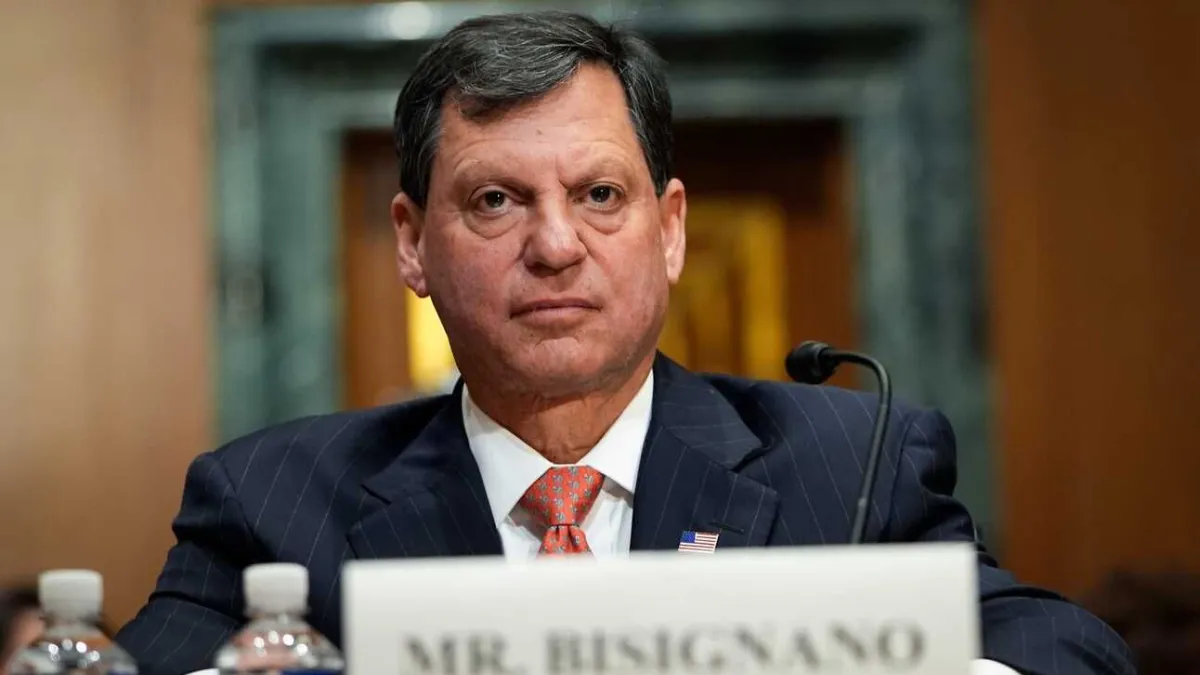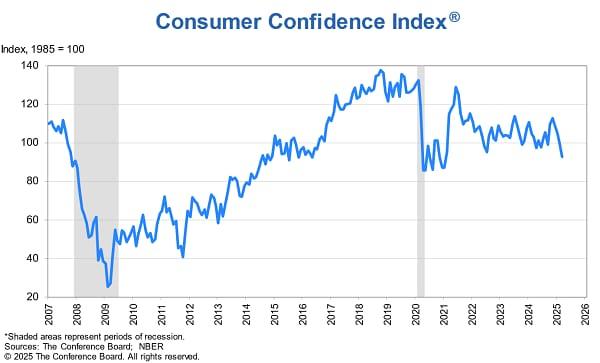
Happy Tuesday! President Trump on Tuesday defended his national security adviser, Mike Waltz, for accidentally inviting a journalist into a private group chat of top officials planning a military strike against Houthis in Yemen. "Michael Waltz has learned a lesson, and he's a good man," Trump said in a phone interview with NBC News. Democrats, meanwhile, slammed top intelligence officials over what one senator described as "sloppy, careless, incompetent behavior." House Democratic Leader Hakeem Jeffries called for Defense Secretary Pete Hegseth to be fired over the matter.\n\nHere's what else is happening.
Trump Pick to Lead Social Security Gets Grilled Amid DOGE Cuts
President Trump's pick to lead the Social Security Administration faced a grilling by Senate Democrats at his confirmation hearing Tuesday, with questions over DOGE-led cuts that have exacerbated customer-service problems and raised fears about the future of the program that pays benefits to more than 70 million Americans.
Who is Trump's pick to head Social Security? Trump chose Frank Bisignano, the CEO of financial technology company Fiserv since 2020 and a former Wall Street executive, to head Social Security. "Frank is a business leader, with a tremendous track record of transforming large corporations," Trump said in a social media post back in December.
Bisignano portrayed himself as an efficiency expert and said he aims to improve service at Social Security. He called the 1% improper payment rate found by Social Security's inspector general "five decimal places too high." Bisignano said Tuesday that his company today processes more than 250 million payments totaling more than $2.5 trillion a day, compared to the 74 million payments a month processed by Social Security, totaling about $1.6 trillion a year.
"We will get the error rate down, and be more accurate in payments," Bisignano pledged. "Working in collaboration with the men and women of the Social Security Administration and you here in Congress, we will better serve the American people."
In an interview with CNBC last month, Bisignano said the clear objective behind his nomination was to turn around the Social Security organization and improve services. "It's going to be a technology story," he said then, indicating plans to use artificial intelligence to target fraud, waste and abuse. "The objective is not to touch benefits," he said. He also called himself "fundamentally a DOGE person," again emphasizing a focus on efficiency.
Bisignano on Tuesday promised to do whatever is required to protect private information at Social Security. He acknowledged a leadership issue at the agency and said he would take charge and would look to improve workforce morale. He also emphasized that Trump has promised not to touch Social Security benefits.
**Fears about DOGE: **The Musk-led effort has targeted Social Security for cuts, and the agency announced last month that it "plans to reduce the size of its bloated workforce and organizational structure" and would be cutting 7,000 of 57,000 workers. It denied rumors of much steeper cuts.
As DOGE hunts for supposed benefits fraud, the already-embattled agency now faces a full-blown crisis, with reports of chaos and service problems caused by staffing shortages and the departures of experienced officials.
"Today's news brings fresh reports that it is bedlam out there in Social Security," Sen. Ron Wyden of Oregon, the top Democrat on the Finance Committee, said Tuesday. "The urgency for today's hearing couldn't be greater. Since Donald Trump took office, Social Security has experienced the most chaos in its history. Mass personnel layoffs, eliminating phone service for basic help, sending seniors to overcrowded and understaffed field offices that have also been put on the chopping block for closure. Political appointees poking around your most sensitive private information, creating a big risk for what I call the mother of all identity thefts."
Wyden and other Democrats warned that claims by Trump and Elon Musk of massive Social Security fraud are a deliberate effort to set the stage for benefit cuts - a scheme to break Social Security in order to "save it."
"I think there's been a plot afoot here," said Sen. Sheldon Whitehouse of Rhode Island. "Step one is to lie about not intending to damage Social Security and about intending to protect Social Security benefits." Step two, Whitehouse warned, was to discredit the Social Security system, to open the door for Musk's team of "tech bros" to take over.
Democrats also expressed fears that Bisignano's business track record might be a prelude to privatizing the program. "The Musk-Lutnick-Trump plan for Social Security is to take away earned benefits from seniors, hollow out the agency in preparation to hand it over to private equity, and give the savings over to their billionaire friends," Wyden claimed.
Bisignano testified that he had "never thought about" privatizing Social Security.
"I've only been given one order, which is to run the agency in the right fashion," Bisignano said, adding, "I don't see this institution as anything other than a government agency that gets run for the benefit of the American public."
Some advocates for seniors still worry: Richard Fiesta, the executive director of the Alliance for Retired Americans, an advocacy group founded by the AFL-CIO, noted that Bisignano had refused to explicitly refute Musk's claim that Social Security is a "Ponzi scheme" and called on senators to reject his nomination.
"Retirees who tuned into Frank Bisignano's confirmation hearing hoping to hear that he planned on halting the chaos and destruction of the Social Security Administration caused by Elon Musk's DOGE team were left disappointed," Fiesta said in a statement. "Mr. Bisignano knows a lot about processing payments and came across as a big fan of artificial intelligence in call centers. Unfortunately, he said nothing to assure older Americans that he gets the unique challenges technology presents to Social Security beneficiaries, who are older and have less access to or familiarity with technology.
Quote of the Day
"This is a new concept in economic warfare. How is it enforceable? It's unclear of course."
− Francisco Monaldi, director of the Latin American energy policy at Rice University's Baker Institute for Public Policy, speaking to Bloomberg News about President Trump's newly announced "secondary tariffs" on Venezuela.
In an executive order signed Monday, Trump said he would impose a 25% tariff on goods from any country that imported oil from Venezuela, either directly or indirectly, starting on April 2, 2025. The new tariffs are being referred to as secondary tariffs, echoing the term secondary sanctions, which are penalties applied to trading partners that trade with sanctioned nations.
Trump cited numerous rationales and authorities for the imposition of the tariff, including his declaration of a national emergency with regard to Venezuela and his designation of the Tren de Aragua gang as a foreign terrorist organization.
The new tariff would hit China the hardest at current trade levels, since China accounts for the majority of Venezuela's oil exports. However, according to the Department of Energy, the U.S. is the second largest foreign market for Venezuelan crude, accounting for about 23% of its total oil exports in 2023, and it is not yet clear how the new tariff will affect that trade.
Consumer Confidence in the Future Hits 12-Year Low
A popular measure of consumer confidence fell for the fourth straight month in March amid growing concerns about the strength of the economy.
The Conference Board said Tuesday that its monthly consumer confidence measure fell 7.2 points in March to 92.9, a larger drop than anticipated. (The index is anchored to 1985, which equals 100.) The decline was broad-based across income groups, with all segments except those earning more than $125,000 reporting a drop in confidence.
A narrower index that measures attitudes about short-term expectations for income, business and the job market fell 9.6 points to 65.2. That's the lowest level in 12 years and below the threshold of 80 that serves as a signal that a recession may be coming.
At the same time, the present situation index, which is based on current conditions, decreased by a more modest 3.6 points to 134.5, suggesting that consumers are more worried about what lies ahead than what they are experiencing right now.
"Consumers' optimism about future income - which had held up quite strongly in the past few months - largely vanished, suggesting worries about the economy and labor market have started to spread into consumers' assessments of their personal situations," said economist Stephanie Guichard of The Conference Board.
The White House said the report has limited usefulness. "I just don't think that there's been a very strong correlation between the confidence data and actual consumer spending in recent years," Stephen Miran, the chairman of the Council of Economic Advisers, told CNBC. "You go out in the street, people are going about their lives, you know, they're getting their paychecks, they're spending their paychecks, the economy is marching on ahead."
But critics of the Trump administration's economic policies, which include punitive tariffs and massive layoffs in the federal government, said the White House is to blame for the decline in confidence. "Trump's presidency has made Americans as pessimistic as they were during a pandemic-induced economic crisis," said Steve Rattner, who served as an adviser to the Treasury secretary during the Obama administration.
Fiscal News Roundup
- Trump Downplays National Security Team Texting Military Operation Plan on Signal as a Minor 'Glitch' – Associated Press
- Democrats Grill Social Security Nominee Over Disruptions as Republicans Defend Trump – NBC News
- Trump Pick to Head Social Security Administration Denies Plans to Privatize – The Hill
- Social Security Chief: DOGE Access to Systems Revoked After Court Order – The Hill
- Long Waits, Waves of Calls, Website Crashes: Social Security Is Breaking Down – Washington Post
- Clock Ticks on Trump and GOP's 'Big, Beautiful' Bill on Taxes – Washington Post
- Treasury Plans 'Substantial' Layoffs as Part of Musk's DOGE Push – Bloomberg
- Elon Musk's 'What Did You Do Last Week?' Email Clogs Government Inbox – Bloomberg
- Meeting with House Panel, OPM Officials Cut Short After Clash Between Top Lawmakers – The Hil
- Trump's Threat of 'Secondary Tariffs' Invents New Trade Tool – Bloomberg
- Trade War Explodes Across World at Pace Not Seen in Decades – Wall Street Journal
- Consumer Confidence Is Tumbling as Financial Concerns Mount – New York Times
- 'Borrowers Have Zero Power': Trump Moving Student Loans to SBA Sparks Concern, Confusion – The Hill
- Trump Tells Senate GOP He Wants a Debt Limit Increase in His Tax Bill – Politico
- Key Republican Says Savings Goal for Trump Agenda Bill Can Be Reached Without Cutting Medicaid Benefits – Politico
- Senate GOP, Dems Prepare to Face Off Before Parliamentarian Over Tax Cut Cost – Politico
- Vaccine Skeptic Hired to Head Federal Study of Immunizations and Autism – Washington Post
- Trump Nominates Republican Once Accused of Mishandling Taxpayer Funds as HHS Watchdog – Associated Press
- GOP-Led States Push for Control of School Aid as Trump Promises a Smaller Federal Role in Education – Associated Press
Views and Analysis
- For Once, a Debt Ceiling Fight May Be Democrats' Best Option – Thomas Geoghegan, New Republic
- What Is DOGE's Real Goal? – Ezra Klein, New York Times
- Smash and Grab: Why Trump Is Moving So Fast – Ed Kilgore, New York
- 'It Is Hard to Imagine a More Sweeping Agenda to Make Americans Less Healthy' – Thomas B. Edsall, New York Times
- When the Government Becomes a Health Misinformation Superspreader – Kevin Griffis, Washington Post
- Liberation Day Will Expose the Bark Vs. Bite Ratio – John Authers, Bloomberg
- Postal Service Needs to Stay the Course, Not Go Private – Thomas Black, Bloomberg
- The Marijuana Laffer Curve – Wall Street Journal Editorial Board
- I Want to Believe in Abundance – Joe Wiesenthal and Tracy Alloway, Bloomberg
- US Infrastructure Improved With Biden-Era Spending but There's a Long Way to Go – Tammy Webber and Michael Phillis, Associated Press
